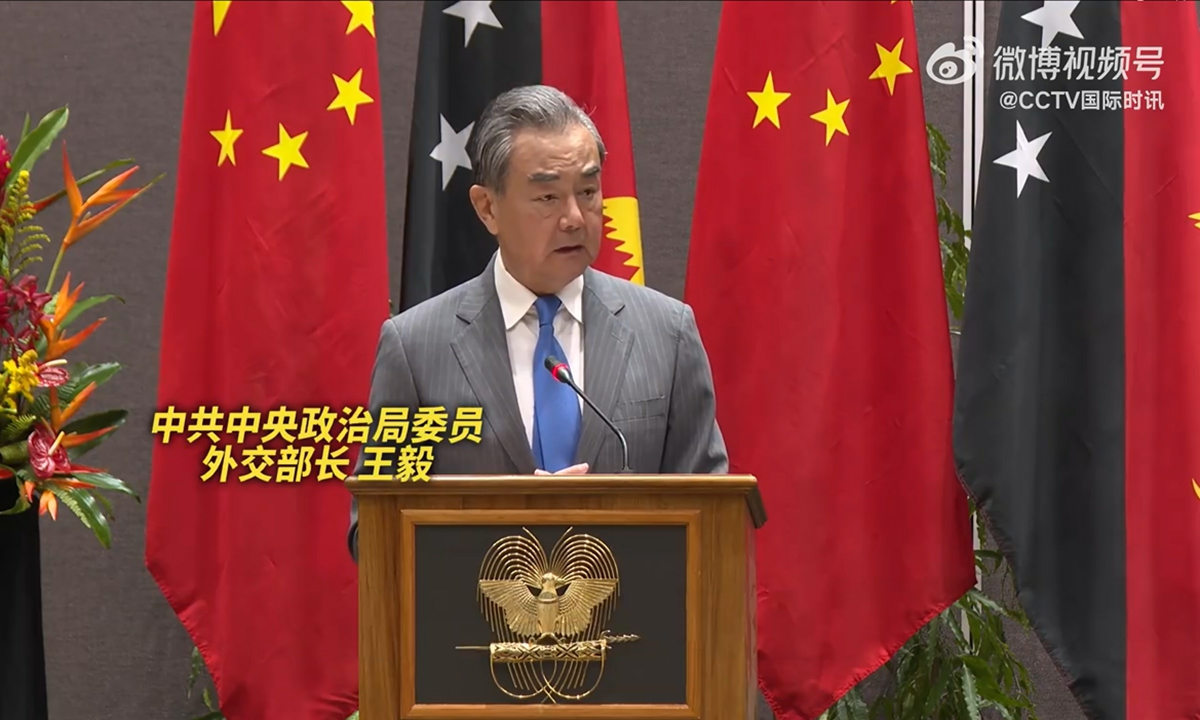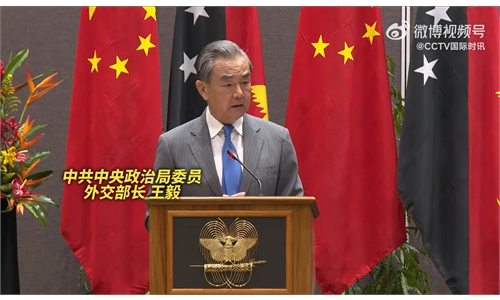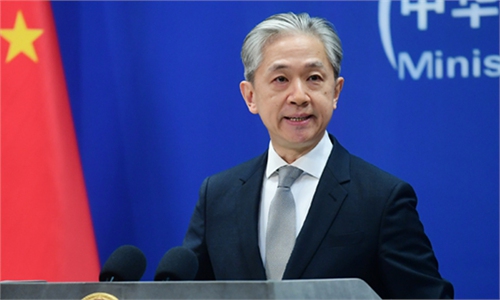Wang warns against provoking camp confrontation in the South Pacific region during PNG visit

Chinese Foreign Minister Wang Yi Photo: CCTV
Chinese Foreign Minister Wang Yi emphasized Saturday that China's assistance to Pacific Island Countries (PICs) has always been free of political conditions and impositions while warning that the AUKUS trilateral security partnership formed by the US, the UK, and Australia will bring instability to the region.
Wang, who is also a member of the Political Bureau of the Communist Party of China Central Committee, made the remarks at a joint press conference after he met with Papua New Guinea's Foreign Minister Justin Tkatchenko, the Xinhua News Agency reported.
Wang said that China's assistance to PICs has always been free of political conditions and impositions, and China has never issued "blank checks". And he also called on the international community to pay more attention to the special situation and legitimate concerns of the PICs, to focus on issues of the greatest concerns to them, such as climate change and improvement of people's livelihoods, and to come up with more ideas, more solutions, more practical work and more good deeds.
The island countries are the homeland of their people, not the "backyard" of any major power, Wang said at the press conference.
Wang also noted that the AUKUS security partnership is stubborn to initiate the development of nuclear submarines into the region, which violates the principles of the South Pacific Nuclear-Free Zone Treaty and poses serious risks of nuclear proliferation. Recently, the US, the UK and Australia have even attempted to rope in more countries to join under various pretexts. Such acts of creating bloc confrontation, sowing division, and exacerbating opposition run completely counter to the urgent needs of PICs and go against the tide of global development.
The senior Chinese diplomat's visit to the PNG, the largest island country among the South Pacific Island countries and home to the Secretariat of the Pacific Islands Forum, showed again China's high regard not only for the PNG but also for Pacific Island countries, sending the message that despite the volatile global situation, China's support for the PICs is steadfast and unwavering, executive director at the Asia Pacific Studies Centre of East China Normal University, told the Global Times on Saturday.
More importantly, the Chinese Foreign Minister once again reaffirmed China's diplomatic stance, the significance of which extends beyond the scope of this trip itself, contrasting to the US' and West's double standards and the camp confrontation they create in the region.
China is not only enhancing cooperation with PNG in traditional fields such as economic and trade aspects but also continuously signing agreements on issues of utmost concern to the South Pacific island nation, including climate change, Chen said.
Any attempt to provoke camp confrontation in the South Pacific region does not serve the urgent needs of South Pacific island countries, Wang Yi said on Saturday.
Foreign Minister Wang Yi has repeatedly emphasized China's commitment to peace and development in the international community during this visit, which is not only an important commitment as a responsible major country but also a clear statement of China's stance on fairness and justice in the international community, in sharp contrast to the US vetoing Palestine's bid for full UN membership, and the AUKUS, essentially a small clique formed by the US targeting China, observers said.
The international community is extremely dissatisfied and disappointed with the US' veto in the Security Council against Palestine's membership as a full-fledged UN member state, Wang said.
As the Asia-Pacific region is a vital engine for global economic development, any disruption to local peace and stability will seriously affect global development and prosperity. The expansion of AUKUS will directly impact global stability and development, thus triggering concern of the international community and all peace-loving people, Chen said.
Although governments and people of various countries in the international community have their own political wisdom and sensitivity, they understand that the strategic intent and goal of Western countries are to maintain their regional and global hegemony. Therefore, from this perspective, such schemes are destined to fail, the expert said.



